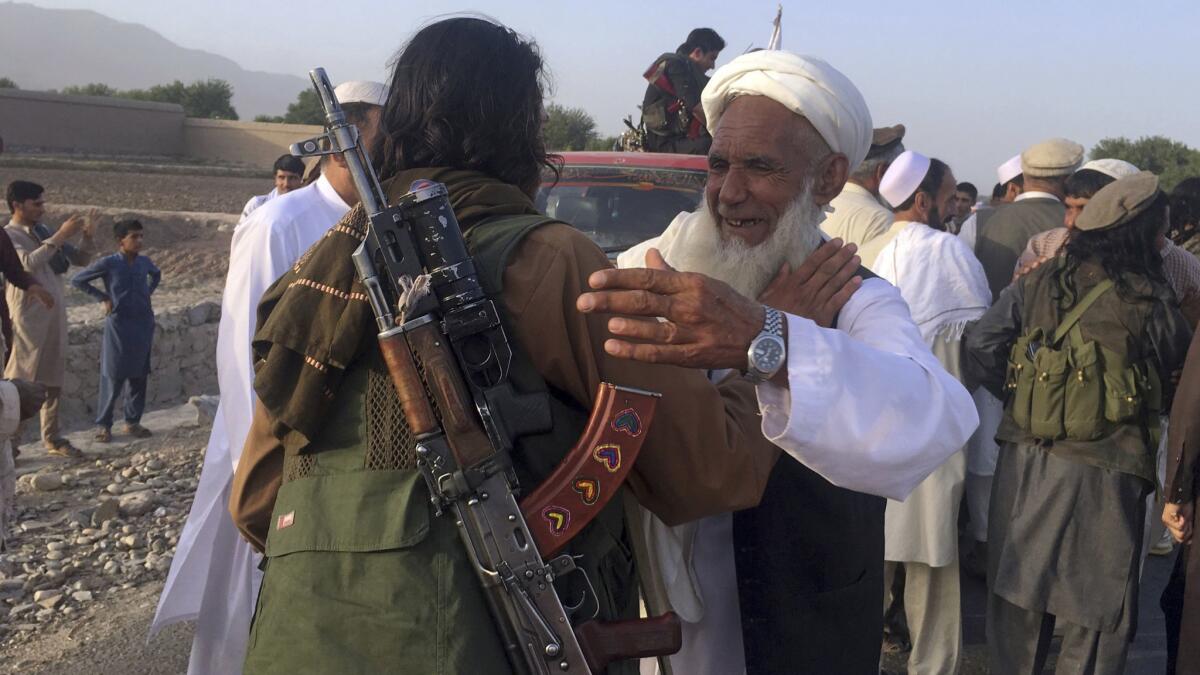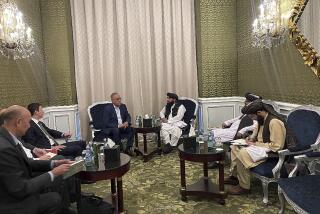Editorial: Talk to the Taliban? It’s worth a try

More than a decade and a half after U.S. forces helped to end the Taliban’s reign in Afghanistan, the Trump administration is encouraging negotiations between that armed Islamist movement and the Afghan government. It’s a defensible policy, but also a depressing reminder of the failure of years of U.S. intervention to bring peace and stability to the country.
More than 2,000 Americans have lost their lives in Afghanistan in Operation Enduring Freedom, which began in 2001 and ended in 2014, and in a “post-combat” mission that continues to this day with about 14,000 trainers, advisors and Special Forces. The United States has spent more than $120 billion on reconstruction in the country.
Yet the Taliban controls or contests significant portions of Afghanistan. It has staged several dramatic attacks in recent weeks, including a major offensive against the city of Ghazni. Islamic State also has established a presence in the country. Meanwhile, the national unity government headed by President Ashraf Ghani continues to struggle with corruption and political and ethnic divisions.
A negotiated settlement of Afghanistan’s civil war would make it easier for the United States and its allies to withdraw their remaining forces.
Ghani has offered to engage in negotiations with the Taliban on a political settlement, and last week announced a three-month cease-fire if the Taliban also agrees to stop fighting. In a statement welcoming the cease-fire announcement, Secretary of State Mike Pompeo said the United States was “ready to support, facilitate and participate in direct negotiations between the Afghan government and the Taliban.”
Clearly, U.S. policy has moved on from the skepticism President Trump expressed last August, when he said that a political settlement involving the Taliban might be possible “someday.” Even before Pompeo’s statement, there were reports that a U.S. diplomat had met with Taliban representatives in Qatar in July.
Russia is also seeking to facilitate negotiations. It has invited the combatants in Afghanistan to Moscow for talks next month. The Taliban has accepted the invitation; the United States and the Afghan government have declined.
Enter the Fray: First takes on the news of the minute from L.A. Times Opinion »
A negotiated settlement of Afghanistan’s civil war would make it easier for the United States and its allies to withdraw their remaining forces. But it also would be in the interest of the people of Afghanistan — so long as it didn’t come at the cost of rights, particularly for women, now secured in the Afghan Constitution.
It isn’t clear that the Taliban would be willing to accept peace on those terms, so obviously the administration must proceed cautiously. It’s also important that the United States not undermine the Afghan government by dealing directly with the Taliban on consequential matters. (Pompeo’s statement seemed designed to offer reassurance on that point.)
Yet with all those qualifications, the administration is right to test the possibility of a political solution to a conflict that stubbornly resists settlement on the battlefield.
Follow the Opinion section on Twitter @latimesopinion and Facebook.
More to Read
A cure for the common opinion
Get thought-provoking perspectives with our weekly newsletter.
You may occasionally receive promotional content from the Los Angeles Times.










